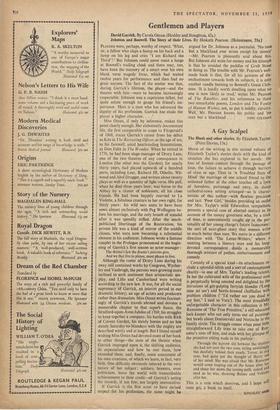A Gay Scalpel
The Blush and other stories. By Elizabeth Taylor. (Peter Davies, 15s.) MUCH of the writing in this second volume of Elizabeth Taylor's stories deals with the kind of situation she has explored in her novels : the loss of human • contact through the passage of time, the failure to achieve it through barriers of class or age. Thus in 'A Troubled State of Mind' the marriage of one school friend to the widowed father of the other touches off a lyric of boredom, patronage and envy, its damp cathedral-town setting arranged—as is charac- teristic of this author—with flawless precision and tact. 'Poor Girl,' besides providing an outlet for Mrs. Taylor's mild Edwardian sympathies, presents a special case of aborted contact in its account of the mousy governess who, by a trick of time, is intermittently caught up in the per- sonality of her young charge's future indmorata: the sort of near-ghost story that women write so much better than men. We move in a different direction with 'The Letter-Writers,' where a meeting between a literary man and his long- devoted correspondent . distils a memorably thorough mixture of pathos, embarrassment and comedy.
Comedy of a special kind—its attachments in- clude a splendid relish and a sort of contemptuous charity—is one of Mrs. Taylor's leading talents. In her the cultivated wife of the professional men is perpetually being amazed and delighted by the intrusions of.gin-gulping fortyish blondes Moog time no see') and beetle-browed chatladies with problem children ("I'd rather see you dead at my feet," I said to Vera'). The most dreadfullY unforgettable character in this collection is Ransome of 'The True Primitive,' a self-educated lock-keeper who not only turns out oil paintings but bawls about Dostoievski and Nietzsche in the family circle. The struggle comes when poor little straightforward Lily tries to take one of Ran- some's sons off him, and ends with her glimpse of the primitive sitting nude in his parloUr :
Through the 'narrow slit between the shutters she had not seen the two sons, sitting unWillinglY but dutifully behind their easels. Terror, in any
case, had quite put the thought of Harry out of her mind. She was afraid that Mr. Ransoms would come leaping out of the house after her and chase her down the towing-path, naked and mad as he was, shouting Balzac and Voltaire after her.
This is a vein which deserves, and I hope will soon get, a book to itself.
KINGSLEY AMIS














































































 Previous page
Previous page